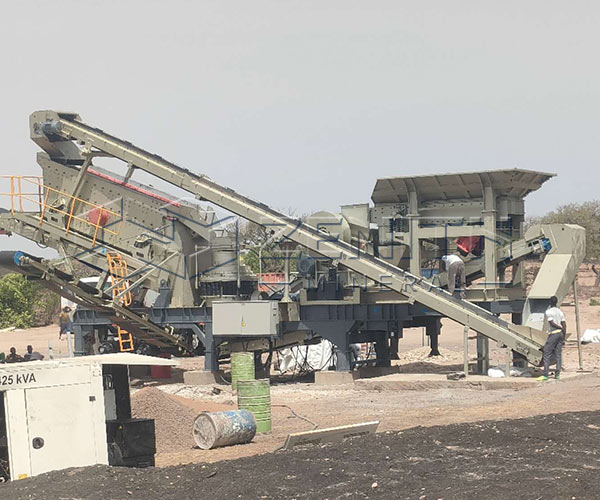
Understanding the Fundamentals of Mobile Crushers in Ethiopia’s Market Landscape
Mobile crushers, also known as portable crushing plants, are versatile machines designed for on-site rock and material reduction without the need for permanent installations.
- Core Functionality: These units integrate crushing, screening, and conveying systems on a mobile chassis, allowing quick relocation to quarries or construction sites.
- Key Advantages: They reduce downtime from material transport, lower labor costs, and adapt to Ethiopia’s rugged terrains, such as basalt-rich areas around Mekelle.
- Market Relevance: In Ethiopia, where infrastructure plans aim to build thousands of housing units, mobile crushers support aggregate needs for concrete and asphalt production.
Ethiopia’s preference for mobile over stationary crushers stems from logistical challenges and the need for flexibility in remote operations.
Local Applications: Ideal for limestone and granite processing in regions like Bahir Dar, enhancing efficiency in road and building projects.
Exploring Various Types of Mobile Crushers and Their Distinctive Features for Ethiopian Users
Mobile crushers come in several types, each tailored to specific material hardness and output requirements, influencing their suitability for Ethiopia’s diverse geological conditions.
- Jaw Mobile Crushers: Primary crushers for coarse materials; robust for hard rocks like granite, with feed sizes up to 500mm.
- Impact Mobile Crushers: Versatile for medium-hard stones like limestone; produce cubical shapes for high-quality aggregates.
- Cone Mobile Crushers: Secondary crushers for fine output; excel in high-throughput scenarios, such as 100-150 TPH basalt lines.
- Crawler vs. Wheel-Mounted: Crawler types offer better mobility on uneven Ethiopian terrain, while wheel-mounted are cost-effective for road-accessible sites.
Each type integrates feeders, screens, and conveyors, but customization varies by manufacturer like Zenith.
Hybrid Configurations: Combining jaw and cone units for multi-stage crushing, common in Ethiopian quarries for 0-25mm outputs.
Capacity Ranges: From small 20-60 TPH units for startups to large 200+ TPH plants for major projects.
Detailed Price Ranges for Different Mobile Crusher Models Available in the Ethiopian Marketplace
Pricing for mobile crushers in Ethiopia typically spans USD 120,000 to USD 550,000, depending on type, capacity, and origin, with Chinese models dominating due to cost advantages.
- Entry-Level Jaw Models (50-80 TPH): USD 150,000-250,000; suitable for small quarries, e.g., PE600x900 units processing limestone.
- Mid-Range Impact or Cone (100-150 TPH): USD 280,000-380,000; ideal for basalt crushing, like PFW1214III impact setups.
- High-Capacity Plants (120-200 TPH): USD 400,000-550,000; full stations with screening, such as 120-150 TPH granite lines.
Regional Comparisons: Ethiopian prices are 10-15% higher than in Kenya due to import duties, but competitive against South African OEMs at ZAR 7-10 million equivalents.
Influence Mobile Crusher Pricing Specifically in Ethiopia
Several variables drive mobile crusher costs in Ethiopia, from global supply chains to local regulations, often adding 15-20% to base prices.
- Capacity and Type: Higher TPH ratings and advanced mechanisms increase prices by 20-40%; cone crushers cost more than jaw due to precision engineering.
- Import and Logistics: Shipped from Asia, freight via Djibouti ports adds 15-20%, compounded by long sea routes and inland trucking challenges.
- Taxes and Duties: 25-30% import tariffs, plus VAT, elevate landed costs; compliance with Ethiopian standards may require certifications.
- Brand and Features: Premium brands like Zenith offer durability but at 10-15% premium; energy-efficient models reduce long-term costs.
Additional Hidden Costs Associated with Owning and Operating Mobile Crushers in Ethiopian Conditions
Beyond purchase, total ownership costs in Ethiopia include operational and maintenance expenses that can add 20-30% annually to budgets.
Shipping and Installation: USD 20,000-50,000 for delivery and setup; prompt assembly is a key advantage, minimizing on-site labor.
Fuel and Energy: Diesel-powered units consume 20-50 liters/hour; hybrid electric options save 15% in fuel-scarce areas.
Regulatory and environmental compliance, such as dust suppression systems, incur extra USD 10,000-20,000.
Practical Strategies for Buyers to Secure the Best Value on Mobile Crushers Tailored for Ethiopia
Navigating Ethiopia’s market requires savvy approaches to minimize costs while maximizing ROI on mobile crushers.
- Source from Reputable Importers: Partner with Zenith branches in East Africa for bundled deals including after-sales support.
- Opt for Local Assembly: Some models allow partial local fabrication, cutting import duties by 10-15%.
- Financing Options: Explore government incentives for mining equipment; lease-to-own reduces upfront capital.
Decisions for Mobile Crusher Investments in Ethiopia
As Ethiopia’s infrastructure ambitions accelerate, mobile crushers represent a strategic investment for efficient, mobile aggregate production. By weighing types, prices from USD 120,000-550,000, and factors like 25-30% duties, buyers can achieve substantial savings and productivity gains.

